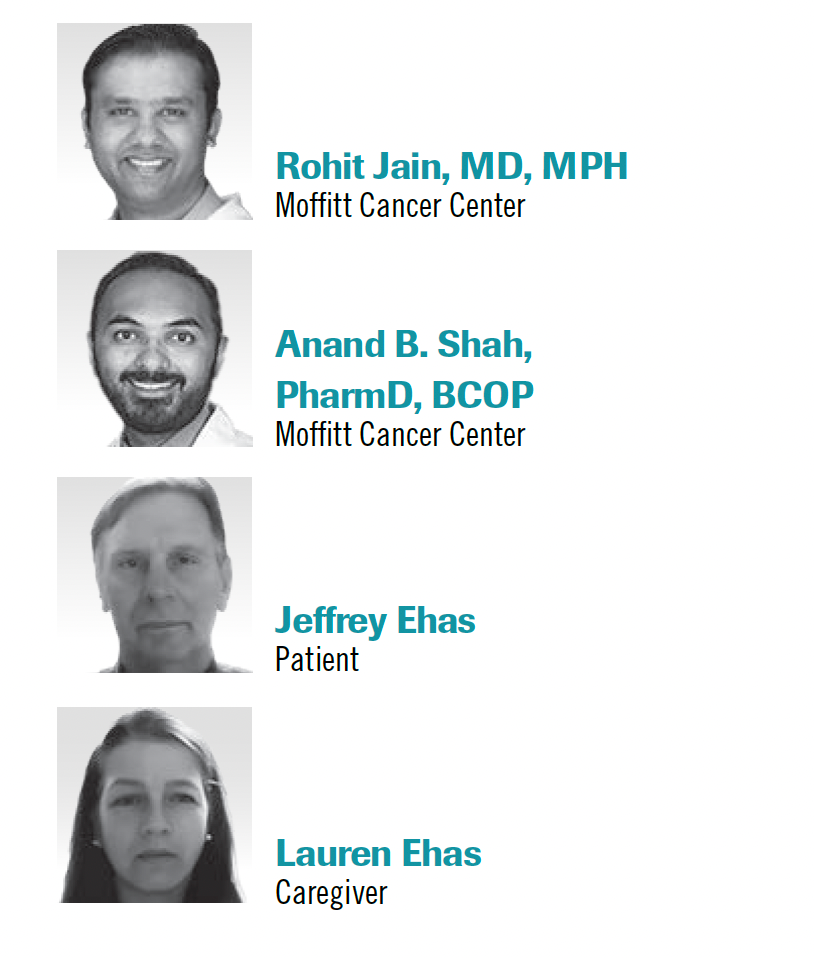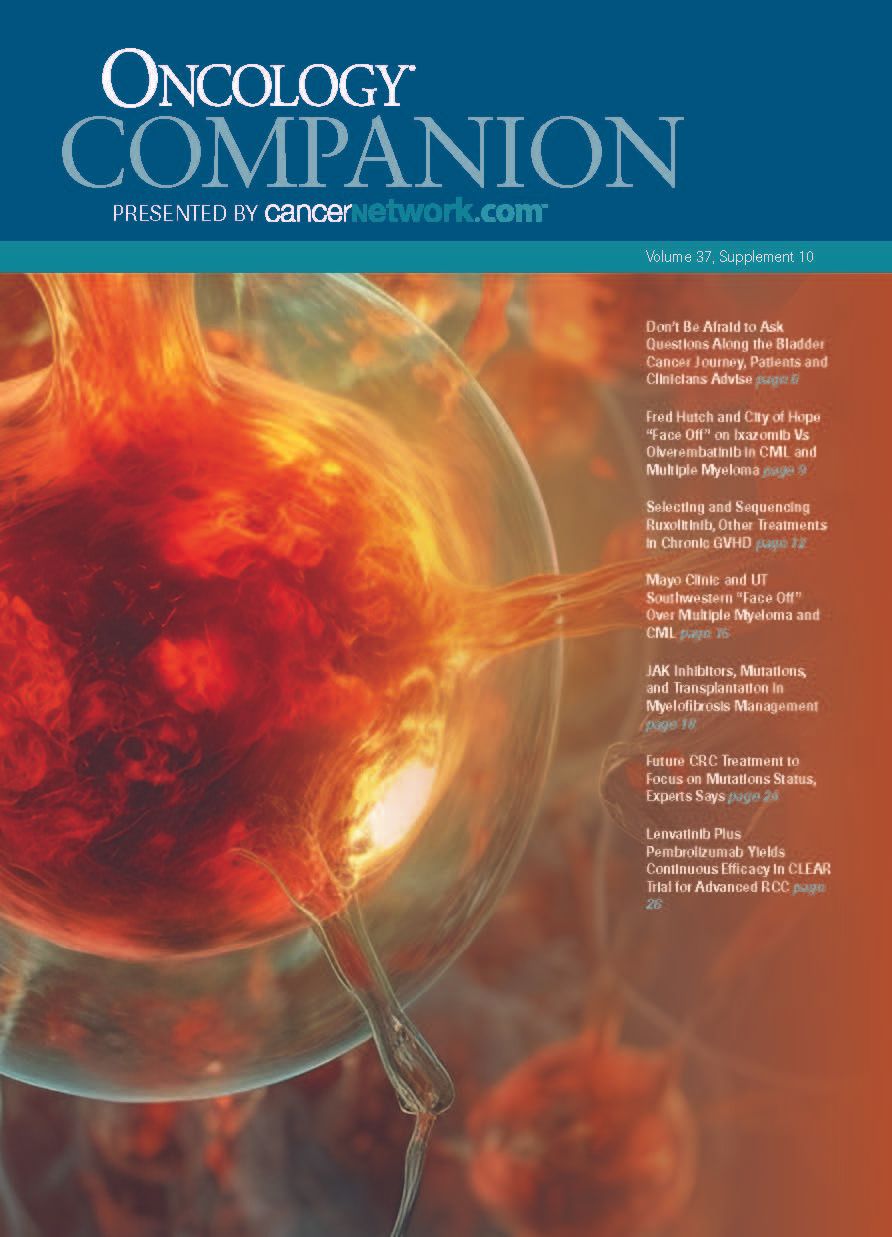Don’t Be Afraid to Ask Questions Along the Bladder Cancer Journey, Patients and Clinicians Advise
A patient with bladder cancer recounts his diagnosis while Rohit Jain, MD, and Anand B. Shah, PharmD, BCOP, review treatment options and the toxicity associated with them.
A patient with bladder cancer recounts his diagnosis while Rohit Jain, MD, and Anand B. Shah, PharmD, BCOP, review treatment options and the toxicity associated with them.

When Jeffrey Ehas was diagnosed with cancer, he and his wife, Lauren Ehas, turned to Moffitt Cancer Center in Tampa, Florida for treatment. With leading clinician Rohit Jain, MD, MPH, and pharmacy oncologist Anand B. Shah, PharmD, BCOP, the Ehas family learned that Jeffrey’s stage IV metastatic bladder cancer could be treated with chemotherapy and combination therapies.
Jain, an assistant member of the Moffitt Cancer Center Department of Genitourinary Oncology, moderated this discussion, while Shah, a clinical pharmacist lead, gave the multidisciplinary perspective. The conversation began with diagnosis, how adverse effects (AEs) were managed, and what advice they would give to other patients with cancer.
Patient Diagnosis
Jain: What symptoms were you experiencing that led you to seek medical care?
Jeffrey: I had first noticed that I had blood in my urine, and it was concerning. We went to the doctor to get it checked out, and it turned out that I was diagnosed with bladder cancer. It was a terrifying moment.
Jain: What were your initial concerns?
Jeffrey: My concern was, am I going to die? How soon am I going to die? [I wanted to know] how long I had, and what I could do.
Lauren: When he was first diagnosed [with cancer], they weren’t sure if he had a treatable kind. [The doctors weren’t sure if it was] epithelial. He was still under anesthesia, and the doctor came and spoke to me about that. It was very scary at the time.
Jain: How did you both become educated on bladder cancer?
Jeffrey: My wife did research online, we read pamphlets [given to us by clinicians], [read] books [provided by] Moffitt, and [talked] to the doctors at Moffitt.
Lauren: [I wanted to] learn as much as I could, wherever I could. When you get a diagnosis like Jeffrey had, you want to do as much as possible to [get to] a favorable outcome for as long as possible.
Jain: What is your role as a caregiver?
Lauren: I feel very fortunate that I might call myself his caregiver, but Jeffrey has done very well throughout this whole time. When someone’s diagnosed with stage IV cancer, you have no idea what you’re looking at and how this procedure is going to go. How is he going to feel during the chemotherapy? Is he going to be sick? Is he going to be weak? Is he not going to be himself? We feel very fortunate that he did well with the chemotherapy without [many AEs]. He was tired, but there was not much difference [from his normal self]. I don’t feel like a caregiver. I feel like he’s been taking good care of himself and I’m just supporting him.
Jeffrey: She is an excellent caregiver. She’s everything to me.
Jain: What is the role of an oncology pharmacist in the pharmacy and therapeutics committee for the treatment patients with metastatic bladder?
Shah: Pharmacists are involved in many different levels within the hospital, and the pharmacy and therapeutics committee is certainly one of them. I’m going to say that’s not only where pharmacists function. The pharmacy and therapeutics committee are where drugs get approved. When we have so many novel therapies come through for oncology, these drugs get presented [to] the pharmacy and therapeutics committee by the clinical pharmacists. The committee votes on it. That’s how these drugs get approved.
More on the clinical side, pharmacists are involved in all our solid tumor clinics. They’re involved in a lot of different things. Pharmacists are involved in patient education and the dispensing side. We are involved in taking care of reviewing orders and medications, dispensing the right medication for the right patient, and making sure that the chemotherapy is dosed appropriately and dosed correctly for our patients.
Jain: Jeffrey, you began treatment with chemotherapy and then transitioned to dose-dense methotrexate, vinblastine, [doxorubicin], and cisplatin. Did you have concerns or questions about this therapy?
Jeffrey: [I wanted to know] how long would it take, if it would it affect my body, and [if I could] tolerate it. Would I be able to do my daily routine, or would I be lying in bed all the time? I was pleased that even after chemotherapy, I was tired, but I was able to do my daily routine and function normally.
Jain: What types of questions are currently asked when treatment regimens are being introduced?
Shah: I tell my residents there is no such thing as overeducation when it comes to chemotherapy and oncology. Our nurses do a fabulous job of educating our patients. Our clinical pharmacists also educate the patients along with the nurses. Now, there is going to be some overlap. If you put yourself in the shoes of a patient, there is so much information that’s being thrown at you that a little bit of overlap and a little bit of repetition is not a bad thing. When we educate patients, we not only talk about the logistics, like the length of the infusion or how long they will stay in the infusion center but we also discuss current medication and premedications they will be receiving.
We [talk] about the toxicity of chemotherapy and how to manage that toxicity, [and] when to call for help. We provide the hotline number that Moffitt provides to all its patients, which is a 24/7 number. As pharmacists, we always make sure that the patient’s medications are up-to-date and there are no drug interactions. The final step that we do in our process is looking at patients’ medications, making sure there are no drug interactions with chemotherapy, educating patients about taking herbal medications [and determining] if they are taking those safely, and disclosing those with your pharmacist team. I’m glad that Moffitt has this multidisciplinary approach because I couldn’t think of a better way of making sure that the patient gets this education.
Adverse Effects Management
Jain: What AEs are observed and how do you mitigate them?
Shah: There’s so many different types of AEs that can happen. We do take some general measures to prevent AEs and minimize AEs from chemotherapy. We’ve come leaps and bounds over the past
10 to 15 years with managing nausea medications. As cisplatin is the gold standard with chemotherapy for bladder cancer, it also causes significant nausea and
vomiting to the point where decades ago we used to have to admit patients because we knew that they would be having a lot of nausea and vomiting. Now not only have we made advances in cancer drugs, but we’ve also made advances in supportive medications. With the supportive medications that we have now, we can have patients like Jeffrey, who went through chemotherapy without a lot of vomiting. That is our goal with all our patients, [but] not every patient is the same. We have a lot of tools in our armamentarium to take care of nausea now.
Jain: Did you experience any AEs while receiving avelumab [Bavencio] as maintenance therapy?
Jeffrey: The overall treatment went very well. My first treatment went without incident. In my second treatment, I had a reaction to it and the nurse had [to] shut the infusion down. The care team came in and gave me [diphenhydramine] and something else, I don’t know what it was. We waited about 30 minutes or so and resumed the infusion without incident. Everything was fine. I received my infusions every 2 weeks, and everything was fine until maybe a year later; I had a second reaction and we lowered the [infusion rate], and I never had a reaction again. I always had to have [diphenhydramine] and [acetaminophen] with [my infusions]. That helped very much, and I got through it without any of the harsh AEs of the chemotherapy. My body responded quite well to it. My daily functions were fine without the AEs of the chemotherapy.
Jain: What are notable immune-related AEs in relation to avelumab, and how do you assess for AEs?
Shah: Avelumab does cause infusion reactions, and it is recommended to administer it with premedications for the first 4 doses. The decision beyond the first 4 doses can be individualized for the patients. If patients don’t experience any AEs or infusion-related AEs, then you can take away those premedications. If they do, then the strategies that were utilized in Jeffrey’s case are exactly what we would do generally, which is to either give them an H1-receptor antagonist, such as diphenhydramine, in addition to acetaminophen, or we can also slow down the infusion rate, which is what happened in his case as well.
Closing Thoughts
Jain: How do you believe the role of oncology pharmacists will evolve?
Shah: Combination therapy is becoming the next form of treatment within oncology. Oncology is getting more complex, but we’re also getting better at taking care of patients. As things get more complex, team-based approaches make more and more sense. You want oncology pharmacists to specialize in taking care of patients with cancer so that you know these new agents that are coming out. You know how to take care of their AEs, and what monitoring is required with these agents. A lot of these new drugs have unique AEs. Back in the day when we had just toxic chemotherapy drugs, they had very similar AEs. Now these agents are very targeted and with targeted drugs come targeted AEs. Just knowing and being aware of these AEs, the role of oncology pharmacists is going to grow in the future as we continue to develop new therapies.
Jain: What has been your overall treatment experience? Do you have any advice for patients with bladder cancer?
Jeffrey: Moffitt is a great place. Everyone was wonderful, helpful, amazing, and intelligent. My advice is, don’t give up hope. There’s always hope. There are always new drugs or new research. I was very lucky because I received avelumab, which had just been approved by the FDA.1 I’m so happy [I was able to receive it] because I’m here today to tell you that there’s always hope. You have to believe there’s always hope, and you have to have a good, strong support system and never stop hoping. Hope for the best.
Lauren: Ask questions. Be organized, be supportive. Don’t live every day like your loved one has cancer. Live every day like it’s a normal day. Enjoy each other, enjoy the days you’re given. Be thankful for the blessings that you do have.
Reference
- FDA approves avelumab for urothelial carcinoma maintenance treatment. News release. FDA. June 30, 2020. Accessed September 12, 2023. https://bit.ly/3PAnsUp
EP: 1.Overview of Metastatic Bladder Cancer
EP: 2.Patient Experience and Collaborative Care in Metastatic Bladder Cancer
EP: 3.Frontline Treatments and Cisplatin Eligibility in Metastatic Bladder Cancer
EP: 4.Patient Treatment Experience and the Role of Oncology Pharmacists
EP: 5.Emergent Data in Frontline and Maintenance Therapy for Metastatic Bladder Cancer
EP: 6.Immunotherapy Management for Metastatic Bladder Cancer
EP: 7.The Evolving Treatment Landscape and Patient Perspectives
EP: 8.Don’t Be Afraid to Ask Questions Along the Bladder Cancer Journey, Patients and Clinicians Advise
